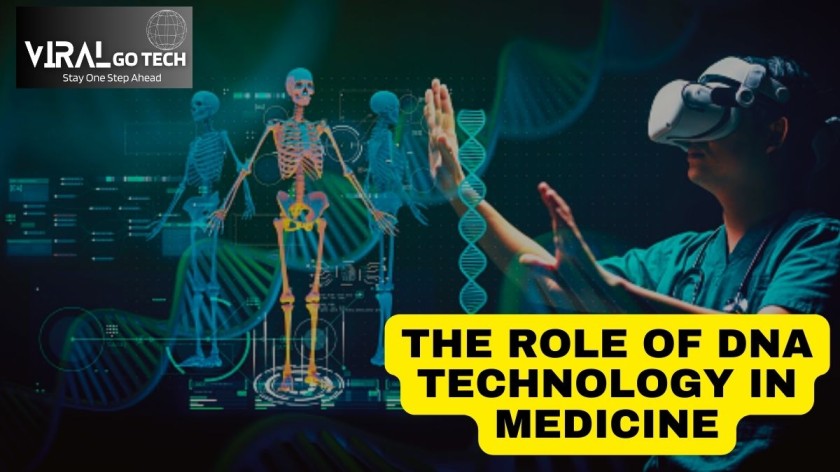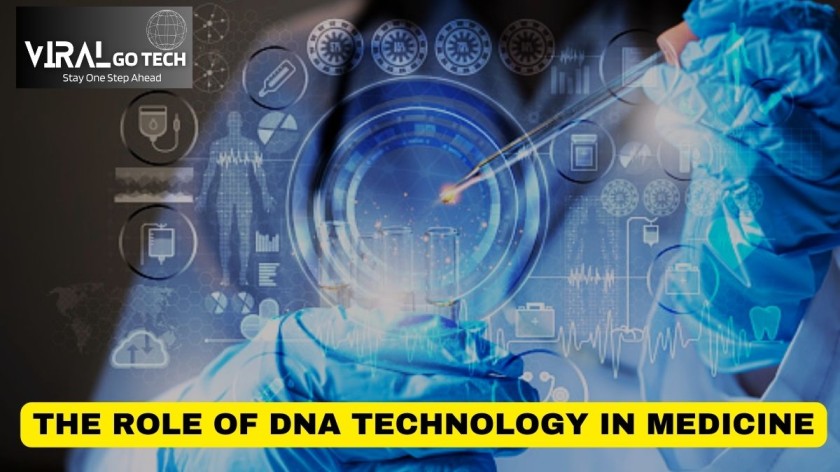The implementation of DNA technology in medicine has sparked a remarkable transformation in the healthcare industry, revolutionizing the approach towards diagnosing, treating, and preventing diverse ailments. Medical experts can now leverage DNA technology to identify and comprehend genetic anomalies and mutations, resulting in precise treatments and customized medical solutions. This article delves into the latest developments and uses of DNA technology in medicine.

Table of Contents
Definition of DNA technology in medicine
The realm of DNA technology pertains to the utilization of genetic information for medical objectives, encompassing the diagnosis, management, and prevention of illnesses. This technology involves the scrutiny of DNA sequences that disclose insights regarding an individual’s genetic constitution. Over the course of time, the use of DNA technology in the domain of medicine has significantly progressed, culminating in enhanced clinical outcomes and personalized therapies.
A brief history of DNA Technology in Medicine
The chronicles of DNA technology in medicine can be traced back to the 1950s when the configuration of DNA was initially unveiled by scientists. During the 1970s, researchers devised methodologies for DNA sequencing, which facilitated the detection of particular genetic anomalies linked to ailments. From that point on, developments in DNA sequencing technology have enabled the rapid and accurate examination of extensive genetic information, propelling additional advancements in medical exploration.
Importance of DNA technology in medicine
The significance of DNA technology in medicine is paramount. Through the scrutiny of a person’s DNA, healthcare providers can pinpoint particular genetic aberrations correlated with illnesses and generate focused therapeutic modalities. Furthermore, DNA technology has given rise to the formulation of personalized medicine, which customizes treatment schemes to an individual’s distinct genetic configuration, thereby yielding superior clinical results.
DNA Technology in Diagnosis
One of the most vital domains of DNA technology in medicine is the sphere of diagnosis. By scrutinizing an individual’s DNA, healthcare providers can detect genetic anomalies linked to ailments, which enables timely identification and personalized therapeutic strategies.
Genetic Testing and its Applications
Genetic testing is a species of DNA technology that enables the recognition of particular genetic aberrations linked to ailments. It encompasses scrutinizing a person’s DNA to ascertain their genetic configuration and identify any irregularities. Genetic testing can serve multiple functions, such as diagnosing genetic anomalies, anticipating the likelihood of developing certain illnesses, and detecting carriers of genetic mutations.
Polymerase Chain Reaction (PCR)
PCR, or Polymerase Chain Reaction, is a DNA technology that permits the magnification of exact DNA sequences. In genetic testing, this method amplifies small quantities of DNA, which simplifies the analysis and identification of distinct genetic aberrations. PCR has transformed the landscape of genetic testing, facilitating swifter and more precise diagnoses of genetic diseases.
Next-Generation Sequencing (NGS)
NGS, or Next-Generation Sequencing, is a DNA technology that empowers the sequencing of vast quantities of DNA within a brief period. This innovation has transformed the domain of genetic research, facilitating researchers to rapidly and accurately analyze copious genetic data. NGS holds enormous potential in medicine, offering many applications such as genetic testing, cancer diagnosis, and personalized medicine.
Gene Therapy and its Applications
Gene therapy is a promising DNA technology that aims to treat or prevent diseases by inserting healthy genes into a person’s cells. This technique has many potential applications in medicine, such as the treatment of genetic disorders, cancer, and infectious diseases. Although still in its early stages, gene therapy has shown promising results in clinical trials and has the potential to revolutionize the field of medicine in the future.

DNA Technology in Treatment
The use of DNA technology has significantly transformed the medical field, offering novel approaches and tools for treating various diseases. Medical professionals can examine a person’s DNA to identify genetic alterations associated with a particular disease and develop treatment plans that are specific to the person’s particular genetic profile.
Pharmacogenomics and Personalized Medicine
Pharmacogenomics involves analyzing a person’s DNA to identify genetic variations that affect their response to medications. With this information, medical professionals can develop personalized treatment plans that are optimized for each patient’s unique genetic makeup.
CRISPR-Cas9 Gene Editing And Its Applications
CRISPR-Cas9 represents an avant-garde DNA technology that has revolutionized the realm of genetic modification. This pioneering technique confers upon researchers the ability to execute meticulous and high-yielding alterations to DNA sequences, an unprecedented accomplishment that carries momentous implications for the amelioration of genetic disorders.
Stem Cell Therapy and its Applications
Stem cell therapy is a form of DNA technology that entails leveraging the potent capabilities of stem cells to rectify and restore afflicted tissues and organs. Stem cells, owing to their intrinsic aptitude to transform into varying cell types, emerge as a highly alluring alternative for mitigating diverse diseases.
Nanotechnology and its Applications
Nanotechnology pertains to the utilization of minuscule particles to transport drugs and other therapies with pinpoint accuracy to diseased tissues. This cutting-edge technique proffers an abundance of benefits in the domain of cancer treatment, as it enables the focused dispensation of chemotherapy drugs and other therapies, resulting in the reduction of side effects and amplification of efficacy.
Future of DNA Technology in Medicine
The field of DNA technology within the medical sphere is undergoing swift and sweeping progressions, and there are numerous enthralling breakthroughs on the cusp of materialization that could metamorphose the landscape of medical treatment. Presented below are some of the upcoming trends that are actively influencing the course of DNA technology in the field of medicine:
Advancements in DNA sequencing technology
With the steady enhancement of DNA sequencing technology, it is steadily becoming swifter, more cost-effective, and more precise. This trend is instigating a surge in the integration of DNA sequencing within clinical settings, heralding the potential to optimize both diagnosis and treatment for an extensive spectrum of ailments.
Precision medicine and its potential impact
Precision medicine pertains to the practice of harnessing genetic and supplementary data to devise bespoke treatment regimens that cater to the idiosyncratic requirements and traits of individual patients. This approach has the capacity to bring about a paradigm shift in the domain of medical care by customizing treatments to the distinct requisites of each patient.
AI and machine learning in DNA analysis
The escalating volume of genetic data being generated necessitates the employment of sophisticated tools to aid in the analysis and interpretation of such data. To address this challenge, the application of artificial intelligence and machine learning algorithms is gaining popularity for their ability to unveil patterns and discern insights within genetic data. This trend holds immense potential in terms of refining diagnosis, treatment, and drug development within the field of genetics.
Global impact of DNA technology in medicine
The impact of DNA technology on the field of medicine is not restrained to a reclusive nation or locality, but its repercussions are being experienced globally. Innovations in DNA technology are aiding in the amelioration of healthcare consequences for people living in both first-rate and burgeoning countries. For instance, in some developing nations where access to healthcare is restricted, the utilization of genetic analysis may facilitate the detection of individuals with a heightened vulnerability to particular ailments. Consequently, preemptive measures can be taken to combat the diseases.
Which career combines DNA technology and medicine?
The impact of DNA technology on the field of medicine is not restrained to a reclusive nation or locality, but its repercussions are being experienced globally. Innovations in DNA technology are aiding in the amelioration of healthcare consequences for people living in both first-rate and burgeoning countries. For instance, in some developing nations where profession that merges the domains of DNA technology and medicine is that of a genetic counselor.
These healthcare experts specialize in utilizing genetic testing and DNA technology to assist patients in comprehending their susceptibility to certain ailments or transmitting genetic disorders to their offspring.
Genetic counselors collaborate with patients to compile and scrutinize their family health histories, arrange for genetic analysis, and decipher the results of genetic tests. Additionally, they impart knowledge and counsel to help patients make informed decisions regarding their healthcare and understand their test results.
A master’s degree in genetic counseling or a related field, along with certification from the American Board of Genetic Counseling, is typically necessary to become a genetic counselor. Furthermore, strong communication and interpersonal skills are imperative for genetic counselors, given their close collaboration with patients and families to offer guidance and support.
Other professions that amalgamate DNA technology and medicine encompass geneticists, medical researchers, and physicians specializing in genetics or genomics. These professionals apply DNA technology to investigate the genetic foundation of illnesses, devise novel treatments and remedies, and offer tailored care to patients grounded on their individual genetic profiles.
Re-access to healthcare is restricted, and the utilization of genetic analysis may facilitate the detection of individuals with a heightened vulnerability to particular ailments. Consequently, preemptive measures can be taken to combat the diseases.
Conclusion
The progressions in DNA technology have transformed the realm of medicine and opened up novel pathways for diagnosing, treating, and preventing various ailments. As this field progresses, we anticipate that personalized medicine will become customary, empowering individuals to acquire tailored treatments contingent on their genetic constitution. Nevertheless, ethical considerations must be taken into account to guarantee equitable accessibility and confidentiality of genetic data.
FAQs
What is the role of DNA technology in medicine?
Techniques are used in DNA technology to manipulate and examine DNA molecules for a variety of medical purposes. It has proven essential in developing medical diagnosis, treatment, and research. The identification of genetic mutations, predispositions, and diseases using DNA technology paves the way for the creation of personalized and focused treatments.
1 thought on “The Role of DNA Technology in Medicine: Advancements and Applications”